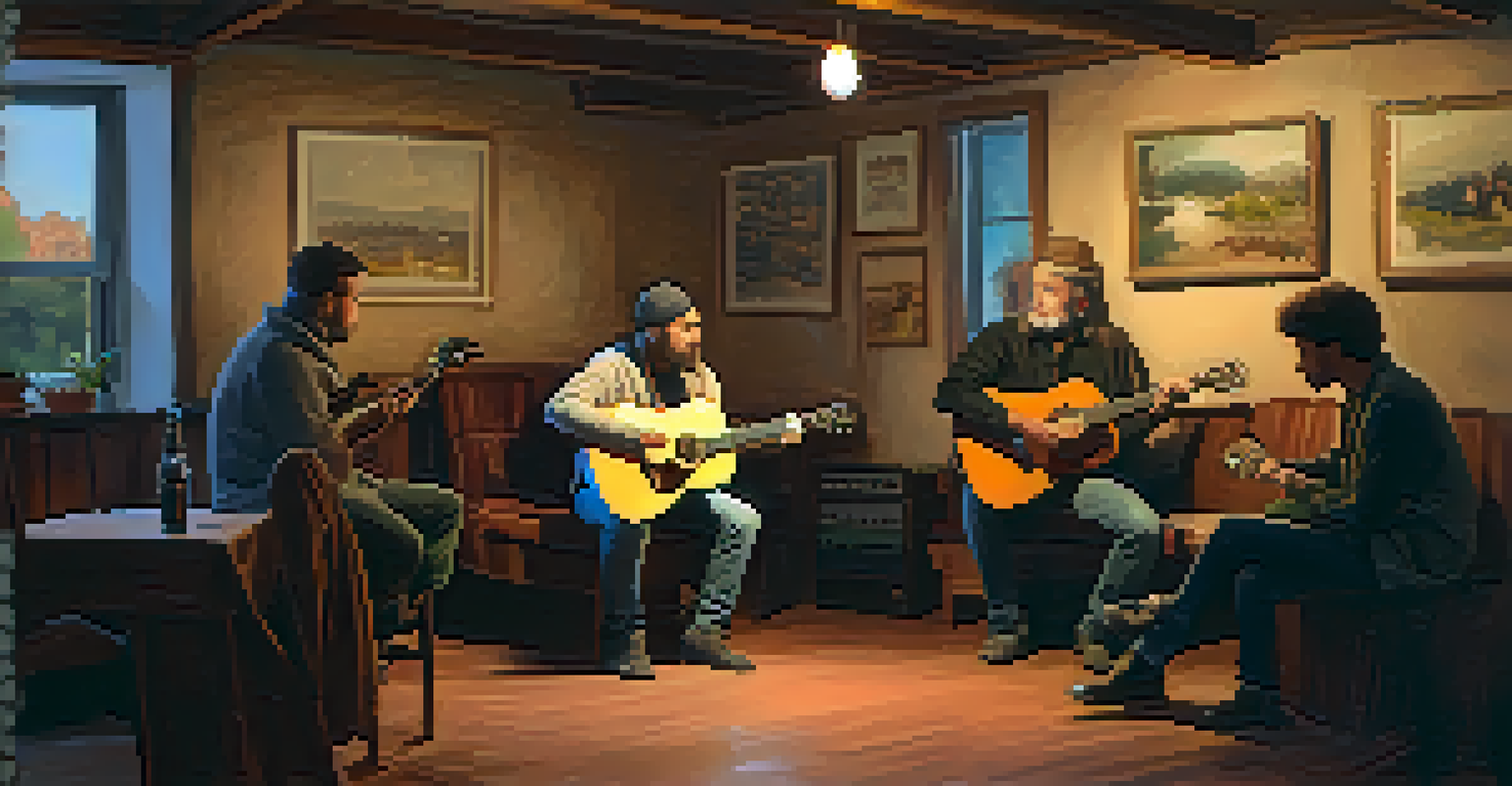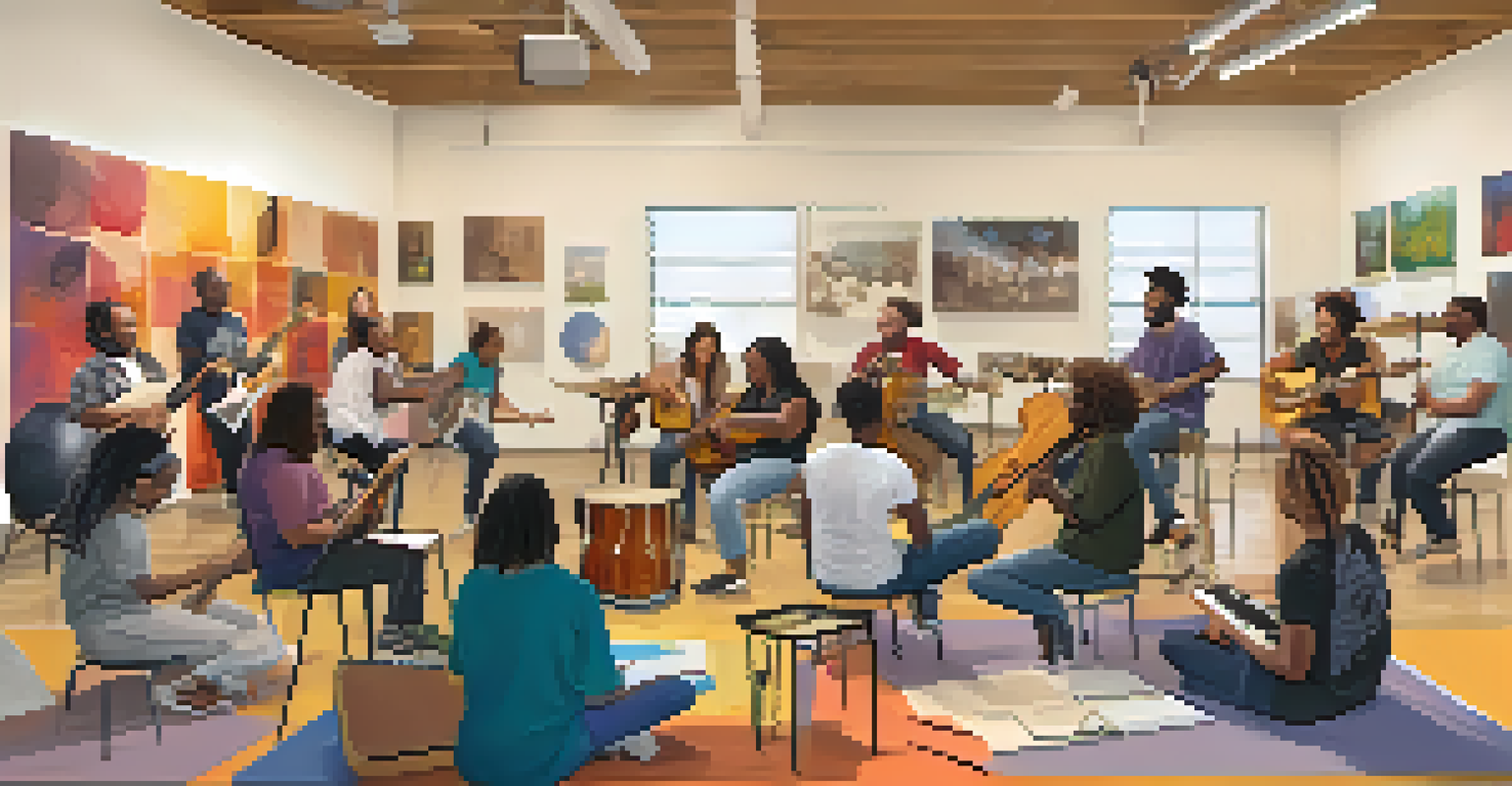Creating Safe Spaces: Music Events for Healing Communities

Understanding Safe Spaces and Their Importance
Safe spaces are environments where individuals can express themselves without fear of judgment or harm. In today's world, where many face emotional and psychological challenges, these spaces play a vital role in community bonding and healing. They allow people to share their stories, experiences, and feelings in a supportive atmosphere, fostering deeper connections among participants.
Music can change the world because it can change people.
Music events serve as an excellent platform for creating such safe spaces. They bring together diverse individuals who may share similar struggles, allowing them to find solace in each other's company. This communal experience can be incredibly therapeutic, as it provides an outlet for emotions that might otherwise remain bottled up.
Moreover, safe spaces encourage inclusivity, allowing everyone, regardless of background or experience, to participate. By creating an environment where people feel valued and heard, we can begin to address the societal issues that often lead to division and hurt.
The Healing Power of Music in Communities
Music has long been recognized as a powerful tool for healing. It can evoke emotions, trigger memories, and even facilitate cathartic experiences that promote emotional well-being. For those dealing with trauma or stress, engaging with music—whether through listening or participating—can provide a sense of relief and comfort.

Participating in music events allows individuals to connect with their emotions and the emotions of others. Whether it's through singing, dancing, or simply enjoying a live performance, the shared experience can create a sense of belonging that is crucial for healing. This collective experience can also help individuals realize they are not alone in their struggles.
Importance of Safe Spaces
Safe spaces allow individuals to express themselves freely, fostering community bonding and emotional healing.
Furthermore, music can bridge gaps between diverse communities. It transcends language and cultural barriers, providing a universal medium through which people can connect and heal together. This is particularly important in areas affected by conflict or social division, where music can act as a unifying force.
Designing Music Events for Healing Impact
When organizing music events aimed at healing, it’s essential to create a welcoming atmosphere. This can be achieved through thoughtful planning, such as selecting accessible venues, ensuring diverse musical acts, and implementing inclusive practices. The goal is to make everyone feel at home, regardless of their musical preferences or backgrounds.
The arts are not a luxury. They are a necessity. They are as vital as education, as vital as health care, as vital as food.
Incorporating interactive elements, like workshops or open mic sessions, can also enhance the healing experience. These activities encourage participation and allow attendees to share their stories and talents. By fostering a sense of community involvement, the event becomes a shared journey toward healing.
Moreover, it's vital to consider post-event follow-ups or support networks. Providing resources for further connection and healing can extend the impact beyond the event itself, ensuring that participants feel supported in their healing journey well after the music has ended.
Case Studies: Successful Healing Music Events
Several communities have successfully implemented music events focused on healing. For instance, the 'Healing Through Music' initiative in a local neighborhood brought together diverse artists and community members for a weekend festival. The event featured workshops, open stages, and spaces for dialogue, creating an impactful experience for everyone involved.
Another example is the 'Songs of Healing' concert series, which aimed to support mental health awareness. This series not only showcased local talent but also included speakers from mental health organizations who shared resources and stories. The combination of music and education provided a comprehensive approach to healing.
Healing Through Music Events
Music events serve as powerful platforms for emotional connection and healing, bridging gaps between diverse communities.
These case studies highlight the potential of music events to create safe spaces that foster healing. They demonstrate how communities can come together to support one another through shared experiences, ultimately leading to stronger, more connected neighborhoods.
The Role of Facilitators in Music Events
Facilitators play a pivotal role in ensuring that music events promote healing and safety. They help set the tone, guiding conversations and activities to create a nurturing environment. Effective facilitators are skilled at reading the room, understanding the needs of participants, and adapting the flow of the event accordingly.
Additionally, facilitators can help participants engage more deeply with the music and each other. They may introduce mindfulness practices, encourage sharing, or facilitate discussions about the themes explored in the music. This added layer of engagement enhances the overall experience, making it more meaningful for everyone involved.
Moreover, facilitators can create a feedback loop, gathering insights from participants to improve future events. By being attuned to the experiences and feelings of attendees, they can help shape events that are truly supportive and healing.
Promoting Inclusivity and Diversity in Music Events
Inclusivity and diversity are crucial components of music events designed for healing. By featuring artists and music from various backgrounds, organizers can create a rich tapestry of experiences that resonate with a broader audience. This diversity not only enriches the event but also fosters understanding and connection among participants.
Furthermore, actively promoting inclusivity means considering accessibility for all attendees. This includes ensuring venues are physically accessible, providing resources for individuals with disabilities, and creating a welcoming atmosphere for people from all walks of life. When everyone feels included, the healing power of music can be fully realized.
Role of Inclusivity in Events
Promoting inclusivity and diversity in music events enhances understanding and connection, maximizing the healing potential for all participants.
Encouraging diverse participation can also lead to more impactful discussions and connections. When people come together from different backgrounds, they bring unique perspectives that can enhance the collective experience and promote greater understanding within the community.
Conclusion: The Future of Healing Music Events
As communities continue to navigate challenges, the need for safe, healing spaces through music becomes increasingly evident. Music events not only provide a platform for expression but also foster connection, understanding, and healing in ways that other forms of engagement may not. They remind us of the power of community and shared experiences.
The future of these events lies in continued innovation and adaptability. By embracing new ideas, technologies, and feedback from participants, organizers can create even more impactful experiences that address the evolving needs of communities. This adaptability is crucial in ensuring that music events remain relevant and effective tools for healing.

Ultimately, the vision for healing music events is one where everyone is welcomed, heard, and supported. By prioritizing safe spaces and inclusivity, we can cultivate environments that not only celebrate music but also nurture the spirit of community healing.